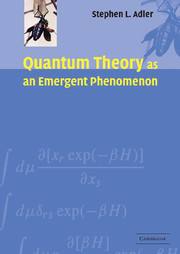 Quantum Theory as an Emergent Phenomenon
Quantum Theory as an Emergent Phenomenon Book contents
- Frontmatter
- Contents
- Acknowledgements
- Introduction and overview
- 1 Trace dynamics: the classical Lagrangian and Hamiltonian dynamics of matrix models
- 2 Additional generic conserved quantities
- 3 Trace dynamics models with global supersymmetry
- 4 Statistical mechanics of matrix models
- 5 The emergence of quantum field dynamics
- 6 Brownian motion corrections to Schrödinger dynamics and the emergence of the probability interpretation
- 7 Discussion and outlook
- Appendices
- References
- Index
Introduction and overview
Published online by Cambridge University Press: 17 March 2010
- Frontmatter
- Contents
- Acknowledgements
- Introduction and overview
- 1 Trace dynamics: the classical Lagrangian and Hamiltonian dynamics of matrix models
- 2 Additional generic conserved quantities
- 3 Trace dynamics models with global supersymmetry
- 4 Statistical mechanics of matrix models
- 5 The emergence of quantum field dynamics
- 6 Brownian motion corrections to Schrödinger dynamics and the emergence of the probability interpretation
- 7 Discussion and outlook
- Appendices
- References
- Index
Summary
Quantum mechanics is our most successful physical theory. It underlies our very detailed understanding of atomic physics, chemistry, and nuclear physics, and the many technologies to which physical systems in these regimes give rise. Additionally, relativistic quantum mechanics is the basis for the standard model of elementary particles, which very successfully gives a partial unification of the forces operating at the atomic, nuclear, and subnuclear levels.
However, from its inception the probabilistic nature of quantum mechanics, and the fact that “quantum measurements” in the orthodox formulation appear to require the intervention of non-quantum mechanical “classical systems,” have led to speculations by many physicists, mathematicians, and philosophers of science that quantum mechanics may be incomplete. Among the Founding Fathers of quantum theory, Einstein and Schrödinger were both of the opinion that quantum mechanics is in some way unsatisfactory, and this view has been amplified in more recent profound work of John Bell, among others. In an opposing camp, many others in the physics, mathematics, and philosophy communities have attempted to provide an interpretational foundation in which quantum mechanics remains a complete and self-contained system. Among the Founding Fathers, Bohr, Born, and Heisenberg maintained that quantum mechanics is a complete system, and a number of recent proposals have been made to improve upon or to provide alternatives to their “Copenhagen Interpretation.” The debate continues, and has spawned an enormous literature.
- Type
- Chapter
- Information
- Quantum Theory as an Emergent PhenomenonThe Statistical Mechanics of Matrix Models as the Precursor of Quantum Field Theory, pp. 1 - 20Publisher: Cambridge University PressPrint publication year: 2004


